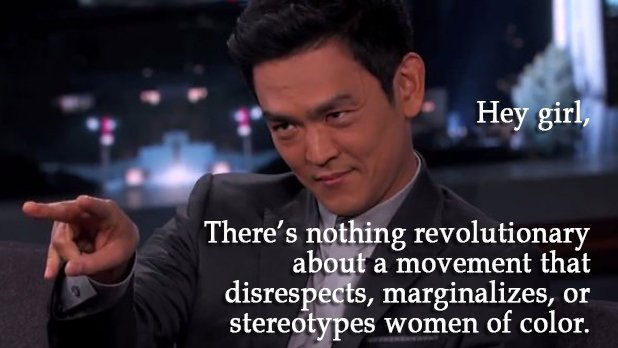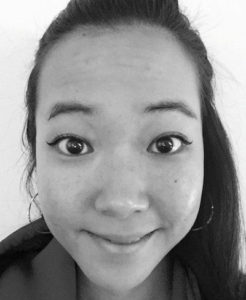
By Guest Contributor: Evelyn Kim (@wordsfromevelyn)
Dear Asian American Men’s Rights Activists (MRAs):
I’ve come across your Reddit threads, your Twitter profiles, and your takes on pop culture. I’m writing to call you out on your take on masculinity, Asian American women, and feminism. Whether you choose to read on or not will reveal your willingness to hear out a fellow Asian American woman’s take on your opinions: it’s your call.
Though you might not have labelled yourself as an MRA, if you agree that the feminist movement takes power away from men, this letter is for you. From what I’ve read, the MRA community began in the early 1970s as an assertion that gender equality had gone too far, and that women had actually started to, in Beyoncé’s words, run the world. The MRA movement has resurfaced online in Asian American digital circles. But the MRA perspective overlooks that men already possess rights and privileges that women do not. So here’s the first thing for you to consider: the point of feminism is not to take your power away.
The term “Men’s Rights Activists” demands that we prioritize the alleged victimization of men. It poses the question, “What about the oppression that we, Asian-American men face? What about our rights?” When this question is posed in opposition to feminism, it suggests that you see empowerment as a limited resource— what some would label as a scarcity mindset— wherein the more empowered that women (particularly Asian American women) are, the more “emasculated” you see yourselves as becoming. But feminism isn’t about taking anything away from people. Neither is it primarily about you (men) in the first place, but as men, your supporting role in feminism is an essential one. In a society that dismisses women’s opinions and complaints as insubstantial or overly emotional, you, as men, can leverage your gender privilege to help others listen to what women have to say.
Feminism is a movement whose purpose is to center the voices and experiences of women who, in the face of systemic patriarchy, experience disadvantages based on their gender. As I hope you can agree, mainstream society takes a dim view of women. The media portrays women as objects of desire rather than the subjects of our own stories. In life, we face an uphill battle of daily struggles to achieve some measure of economic, political and social parity with our male counterparts. We are objectified and lauded when possessed, and scrutinized and villainized when we defy possession. The street harassment we endure, for example, is a constant and demeaning reminder that men feel entitled to our bodies.
Feminism is a much-needed counterpoint to society’s profound disdain for women. Feminism gives women a space to be heard and to be seen as worthy of respect, not harassment; and, to be seen as worthy of dignity, not denigration. For Asian American women in particular, feminism can provide a counterpoint to the cultural expectations of gender that we might have internalized throughout our lives. For instance, I credit feminism for helping me to find my voice: to speak my mind during group discussions, to be unafraid about having opinions on the topics that interest me, and to become more comfortable with stating my wants– all traits that my native Korean culture doesn’t seem to encourage in women. Through feminism, I’ve come to understand that it’s okay for my thoughts and experiences to take center stage in a conversation, even though I’m used to functioning in an environment in which others expected me to prioritize others’ voices over my own. In this way, among many others, Asian American feminism speaks to the distinct experiences that Asian American women face based on their race (Asian) and gender identity that mainstream feminism cannot. This is why mainstream feminism, which caters to white women, is incompatible with discussing how toxic masculinity damages men of color. But that’s a process that Asian American feminism can speak to, because this specific type of feminism considers one’s racialized experiences and helps to dismantle white supremacy, which is the basis of our society’s idea of masculinity.
That needs to change, too. Specifically, the type of toxic masculinity that is pervasive throughout society and that thrives on deprecating men and objectifying women. We should challenge and dismantle that type of masculinity. Elements of the mainstream’s hostile version of masculinity have dominated the discourse about Asian American masculine identity: among the Asian American MRA, the Asian American male pursues validation as an “alpha male” who is defined by his aggressiveness, his physical stature, and his capacity to seduce women. Of course, Asian American men are fully capable of embodying these characteristics. But, we rarely ask: why must this be our community’s prized standard of manliness?
I’d argue that Asian American men who subscribe to the “alpha male” standard of masculinity, which white men often perpetuate, are submitting to a white supremacist view of gender. A White man’s respect of your idea of masculinity isn’t required for it to hold legitimacy. That’s why claiming to fight for Asian Americans while advocating for your brand of masculinity is a paradox: how can you simultaneously fight for people of color while subscribing to an idea of gender rooted in white supremacy?
Your Asian racial identity doesn’t erase your male privilege, just like my being a woman doesn’t erase my privilege as a cisgender person. This is something that John Cho didn’t seem to realize in his Vulture interview. Though, as people of color, you don’t have white privilege, your being male still comes with advantages that you do wrong by denying: A pay gap exists, with Asian American men earning more than Asian American women. Asian American men are less likely to experience street harassment and sexual assault. Asian American men also benefit from a culture that doesn’t view their masculinity as something to be demeaned, whereas we can use the phrase “like a girl” to insult another person.
When you focus your politic exclusively on Asian American men to the exclusion of Asian American women, you deny the fact of your male privilege. Further, you neutralize any pretense that you fight – often militantly — for justice for Asian Americans. Your politic demands “empowerment” of Asian American men, yet it seeks to materialize that “empowerment” through preserving system that perpetuates violent injustice against Asian American women.
That’s why I’ll ask: in seeking to preserve this system are you genuinely fighting for racial justice for all Asian Americans, or do you fight only for yourselves?
Sincerely,
Evelyn

Evelyn is a queer Korean American and emerging writer, and a yoga enthusiast with a sweet tooth. You can follow her on Twitter at @wordsfromevelyn.
Learn more about Reappropriate’s guest contributor program and submit your own writing here.
